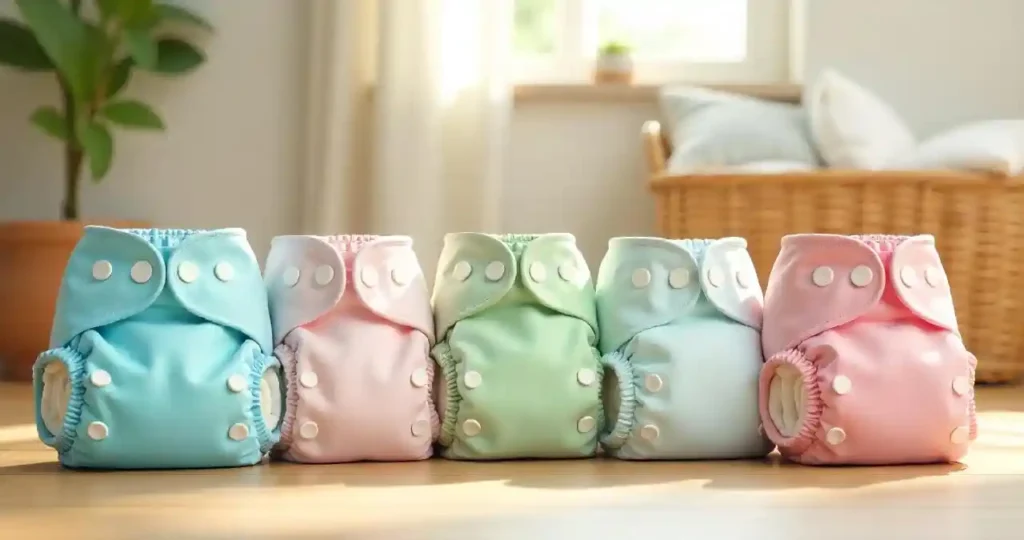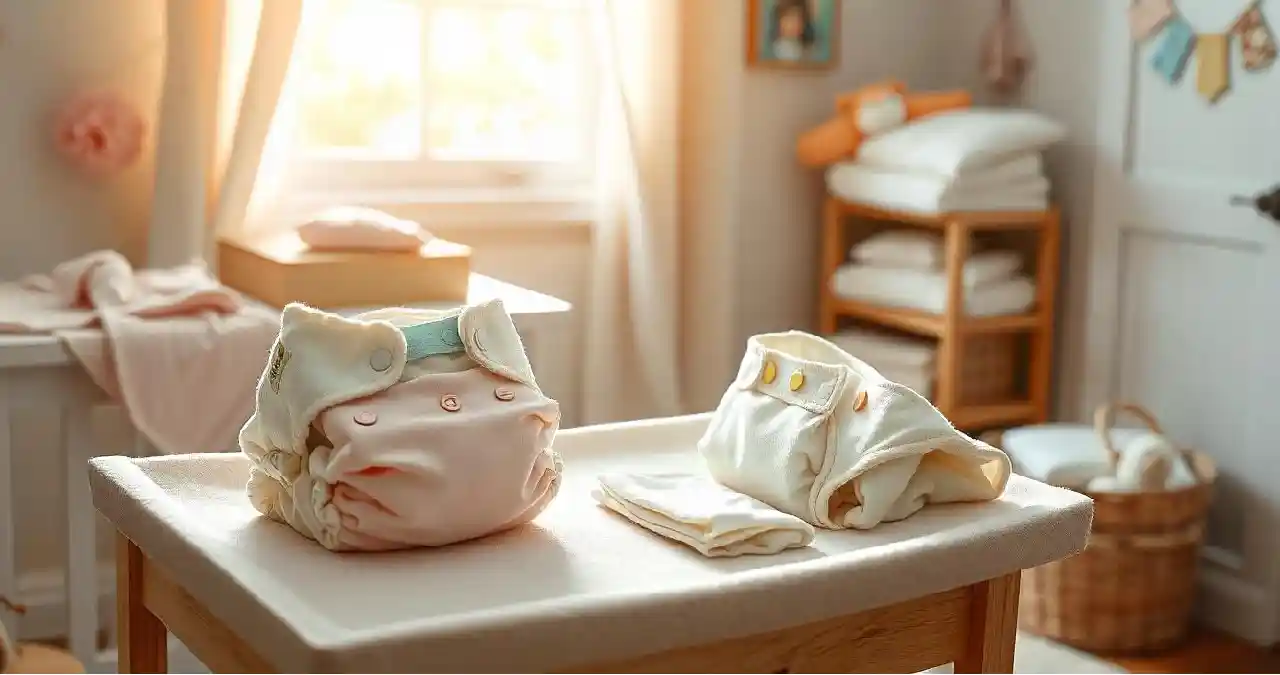As a parent, most of our focus is on providing a comfortable and delicate lifestyle for our children. To provide ultimate comfort to babies, suitable clothing plays a vital role. Newborn baby diapers focus on ultimate comfort for your baby’s soft skin and we should all keep an eye on this. Newborn cloth diapers have gained huge popularity, especially among eco-conscious parents because of their durability, cost-effectiveness and gentleness. How? Let’s see.
This guide explores everything you need to know about using cloth diapers for newborns, helping you make an informed choice for your little one.
What are Cloth Diapers for Newborns?
Newborn cloth diapers are reusable, washable fabric diapers that are specially designed to fit perfectly on newborns. It has various shapes and also different types for all aged babies. Unlike disposable diapers, they come in various designs and materials to manage different needs. These materials offer a sustainable and cost-effective choice. With the amazing eco-friendly collection, they can be sanitized after wash and you get them at the very cheapest price.
Cloth diapers typically include two layers, outer layers – waterproof covers to prevent leaks.
And, inner layers – absorbent fabrics such as cotton, bamboo, or microfiber.
How to Use Newborn Cloth Diapers
Using newborn cloth diapers can seem difficult originally, but with practice, it becomes very simple. Here’s how you can get started:
1. Preparation:
Pre-wash new diapers to remove any manufacturing residues and improve absorbency.
Adjust diapers according to your favour style, and fold diapers if needed such as pre-folds or flats.
2. Changing Your Baby:
To change your baby’s diapers, first lay the diaper under your baby. But, ensures it should fit snugly but not too tight.
3. Handling Soiled Diapers:
Remove solids by rinsing the diaper or using a diaper sprayer. Then, place used diapers in a wet bag or diaper bucket until washing.
4. Nighttime Solutions:
At nighttime, it should be better to add extra absorbency layers for overnight use.
5. Washing and Drying:
Wash diapers every 2–3 days to prevent odours and stains. It could be good to follow the manufacturer’s instructions for the drying procedure.
Practical Tips for Using Cloth Diapers on Your Infant
Some practical tips are following for using newborn cloth diapers.
- Different types of cloth diapers suit various needs. Try a mix before settling on one.
- Liners make it easier to manage soiled diapers and reduce staining.
- Ideal for storing used diapers when you’re out and about.
- Every baby is different; adjust snaps or folds for the best fit.
Cloth Diapers vs. Disposable Diapers: What Is the Difference?
| Aspect | Cloth Diapers | Disposable Diapers |
| Cost | Higher upfront but cost-effective overtime | Recurring expense |
| Environmental Impact | Re-usable and eco-friendly | Contribute to landfill waste |
| Convenience | Requires washing and maintenance | Easy to use and dispose of |
| Skin-friendliness | Free from chemicals, very gentle on the skin | May irritate due to chemicals |
Are Newborn Cloth Diapers Safe for Your Baby’s Delicate Skin?
Yes, newborn cloth diapers are generally safe for your baby, especially when made from natural fibers like organic cotton or bamboo. These materials are hypoallergenic means they prevent rashes or irritation, Breathable means they promote airflow, reduce the risk of diaper rash, and chemical-free which doesn’t contain harmful substances like chlorine or fragrances.
Pros and Cons of Using Newborn Cloth Diapers
There are some of the chosen advantages and disadvantages of using newborn cloth diapers. Including:
Pros:
- Eco-Friendly: Using cloth diapers can significantly reduce dump waste.
- Cost Savings: They are long-term savings items because it very reasonable rather than disposable diapers.
- Customizable Fit: Adjustable to suit your baby’s size and needs.
- Health Benefits: Cloth diapers are totally free from harmful chemicals. But, before purchasing, you should check the fabric quality.
Cons:
- Time-Intensive: Requires washing and drying.
- Learning Curve: Takes time to master folding and fitting techniques.
- Bulkiness: This can be sometimes too loose to wear.
Choice is yours!

Best Brands for Cloth Diapers for Newborns
Here are some top-rated brands you should review and buy:
1. GroVia Newborn All-in-One: Known for its soft fabric and excellent fit.
2. BumGenius Littles 2.0: A popular choice for ease of use and reliability.
3. Thirsties Duo Wrap: Known for being highly flexible and leak-proof.
4. Charlie Banana: Offers eco-friendly materials and multiple designs.
5. Lil Joey by Rumparooz: Perfect for tiny newborns with an umbilical cord snap-down.
Washing Tips for Cloth Diapers
Proper washing is crucial to maintaining hygiene and growing the life of newborn cloth diapers:
- Start with a cold water rinse to remove any residue.
- Avoid fabric softeners, bleach, and fragrances.
- Wash in warm or hot water with an extra rinse.
- Air-dry in sunlight, or use a low-heat dryer system.
Different Types of Cloth Diapers
Cloth diapers are a sustainable, reusable, and economical alternative to disposable diapers. They come in various styles and designs. Below we mentioned the primary types of newborn cloth diapers:
1. Flat Diapers
Flat diapers usually have single-layer rectangular or square pieces of fabric and are made of cotton, bamboo, or hemp. They are usually cheap, quick to dry, versatile and can be folded in multiple ways. But they are not waterproof, so a cover is needed. Flat diapers are best for budget-conscious parents or those who prefer simple, traditional options.
2. Prefold Diapers
Similar to flat diapers but come pre-folded and stitched into a rectangular shape with multiple layers for added absorbency. They are affordable, have customizable absorbency, and are easier to fold than flats. Prefold diapers are best for newborns and infants, as they come in multiple sizes.
3. Fitted Diapers
Shaped like disposable diapers with elastic leg openings and waist. They often have snaps or Velcro for fastening. Fitted diapers have great absorbency and fit and no folding is required.
Best for heavy wetters and overnight use.
4. Pocket Diapers
Diapers with a pocket in the inner layer where inserts (absorbent pads) are placed. The outer layer is waterproof. Beneficial for adjustable absorbency, is easy to use, and is quick to change.
They are best for active babies and toddlers due to their snug fit.
5. All-in-One (AIO) Diapers
Diapers with an absorbent inner layer and a waterproof outer layer sewn together. AIO are closest to disposable diapers in terms of convenience and no assembly is required. They are best for looking for a simple, all-in-one solution.
6. All-in-Two (AI2) Diapers
Similar to AIOs, the absorbent insert is severable. AI2 is quicker drying, and only the insert may need replacing during a change. They are best for parents who always find a balance between convenience and cost-efficiency.
7. Hybrid Diapers
A mix between disposable and cloth diapers, featuring a reusable cover and either cloth or disposable inserts. Flexible and travel-friendly; less waste compared to full disposables. Best for families who travel frequently or prefer an eco-friendly disposable option.
Conclusion
Newborn cloth diapers are an excellent choice for eco-conscious parents who always find a sustainable and safe diapering solution. By choosing the right type, maintaining proper hygiene, and using the practical tips that we mentioned before, you can ensure a comfortable and eco-friendly diapering experience for your baby. Keep your baby stay safe and comfy.
Frequently Asked Questions
Q1. How many cloth diapers do I need for a newborn?
Ans: You’ll need around 20–24 diapers to cover daily changes and washing cycles.
Q2. Can I use cloth diapers at night?
Ans: Yes, adding extra absorbent layers or using nighttime-specific cloth diapers can prevent leaks.
Q3. How do I prevent diaper rash with cloth diapers?
Ans: Ensure frequent changes, and proper washing, and use breathable fabrics to keep your baby’s skin dry and rash-free.
Q4. Are cloth diapers suitable for premature babies?
Ans: Yes, many brands offer small sizes tailored for preemies.
Q5. Can I resell cloth diapers?
Ans: Absolutely! Many parents resell gently used cloth diapers in excellent condition, further reducing costs.
Q6. How long do cloth diapers last?
Ans: With proper care, cloth diapers can last 3 to 4 hours.

